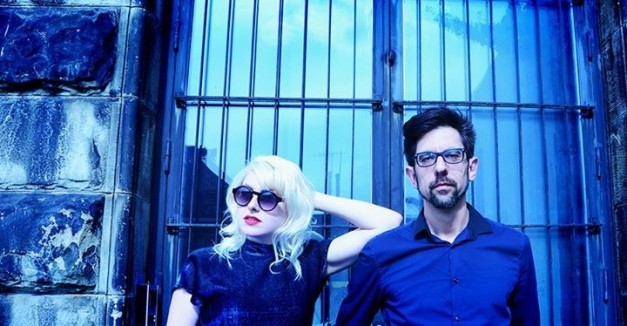Doors: 8 p.m. || Show: 9 p.m.
$5: 21 and up || $7: 18 and up
The Bourbon Theatre presents…
::: Sleepy Kitty Music :::
What do Pavement, MGM musicals, Robert Rauschenberg, Iggy Pop and Jean Luc Godard have in common? Not much, to most people. But for St. Louis-based duo Sleepy Kitty, all these sublimely weird and seemingly contradictory art forms are source material and inspiration for their sophomore release, Projection Room.
Projection Room is a gorgeous art-punk achievement by the band that sees them creating a cohesive new sound, while still including flagrant waves to their pop culture influences. It’s art-school reference and experimentation with rock instruments and flaming guitar solos, but a musical theater backbone and ’60s stacked harmonies. And it’s catchy as hell.
Sleepy Kitty began to take shape at the end of 2008, when Evan Sult, who was drumming for Chicago’s Bound Stems after an eight-year stint in late-’90s alt-radio band Harvey Danger, met Paige Brubeck at a party. She was studying at the School of the Art Institute of Chicago and playing in the all-girl band Stiletto Attack. For a project that originally began as an outlet for the duo to do “weirdo stuff that our own bands weren’t interested in doing,” as Sult says, Sleepy Kitty has quickly become a full-fledged enterprise. Based out of their self-described “art castle,” a studio space in the middle of Cherokee Street in St. Louis, MO, Sleepy Kitty is a multimedia project: the two collaborate professionally on music, rock posters, album artwork, and fine art together. It’s this space that has birthed two Sleepy Kitty EP releases and a debut LP, Infinity City (2011), and is home to a blossoming art and graphics project under the same name.
The band is gaining momentum at an incredible pace, securing awards as Best Indie Band several years running in the Riverfront Times, St. Louis’ weekly paper, and scoring support slots for the likes of Deerhoof, Best Coast and Jeff The Brotherhood, as well as performances at LouFest and Middle of the Map Fest in both 2012 and 2013. With Paste Magazine calling their 2011 release “spectacularly catchy,” with “just enough cute…combined with distorted rock and a heavy drum beat,” 2014’s Projection Room is a natural step forward for the duo, and is their own garage-pop dream.
From the found-sound snippet of “(Opening Scene)” to the glittering vocal harmonies of first single “Don’t You Start” to the French-pop ye-ye kicks of “Nothing = You,” Projection Room quickly establishes a brashly cinematic scope. “What Are You Gonna Do When You Find Bigfoot?” poses a frank question to Sasquatch hunters everywhere (as well as anyone chasing a dubious dream), and “The Hoax” builds from sunny day to sudden summer storm as Brubeck whips up some righteous anger over a disappointing relationship.
But the cameras really start to dolly for the sprawling, epic centerpiece “Godard Protagonist Inflection,” a song inspired by Brigitte Bardot’s doomed character in Jean Luc Godard’s 1963 stunner Contempt. “There’s so much space and emotional tension throughout the film, you want to intervene and help these two characters communicate with each other,” says Brubeck. “The track is a musical interpretation of the film. It was a beast to record, but one of the tracks that we’re most proud of.”
Sleepy Kitty’s conversational interaction with film, radio, and visual art across the decades is the key to Projection Room. “The Agony and Ecstasy of Mike Daisey” reflects on a painfully awkward episode of NPR’s This American Life, a show the band listens to faithfully. “All I Do Is Dream of You” updates a 1934 song from the classic musical Singin’ in the Rain with a sweetly bright surf rock vibe, and “Batman: The Ride” is a funny, poignant recreation of the long, long wait for the Six Flags ride, with some unexpected details.
Closing track and second single “Hold Yr Ground” is a true story about St. Louis, that begins with a message from the band to the unknown dude who stole their first tour van. “St. Louis is an amazing, beautiful and unique city,” says Brubeck, “and it also turned out to rougher than I thought it was.” The track is a fitting end to the record, an anthemic ode to the town and the street that has shaped them.




